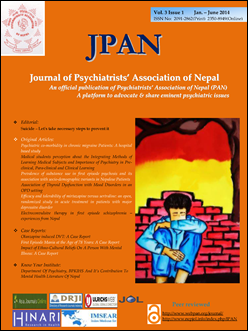Electroconvulsive Therapy in First Episode Schizophrenia – Experiences from Nepal
DOI:
https://doi.org/10.3126/jpan.v3i1.11350Keywords:
ECT, schizophrenia, first episode, BPRS, GAFAbstract
Introduction: Little is known regarding efficacy and effectiveness of electroconvulsive therapy (ECT) in young, first episode schizophrenia. Present study was done to evaluate short term and long term efficacy and effectiveness of ECT in patients with first episode schizophrenia.
Materials and methods: This is a prospective study where forty five patients were evaluated at medical college in Nepal.12 patients received ECT as compared to 33 non-receivers. Patients were evaluated at admission, at discharge, 1st month, 6th month and at 12th month after discharge from the hospital. Evaluations were done using Brief Psychiatric Research Scale (BPRS), Global Assessment of Function (GAF).
Results: The mean duration of hospitalization was25.42 days among ECT receivers as compared to 34.75 days among non-receivers. Patients who received ECT showed significant improvement in BPRS at discharge (p=0.001), 1st month (p=0.001, 6th month (p=0.001) and at 12th month (p=0.001). Similarly there was significant improvement in GAF at discharge (p=0.001), 6th month (p=0.053) and at 12th month (p=0.003).
Conclusion: Though used infrequently, ECT in young first episode schizophrenia give significant overall improvement and wellbeing with very minimal side-effects. ECT also shortens duration of hospitalization with early discharge and improvement in psychosocial wellbeing.
DOI: http://dx.doi.org/10.3126/jpan.v3i1.11350
J Psychiatrists’ Association of Nepal Vol .3, No.1, 2014: 35-40
Downloads
Downloads
Published
How to Cite
Issue
Section
License
This license enables reusers to distribute, remix, adapt, and build upon the material in any medium or format, so long as attribution is given to the creator. The license allows for commercial use.




